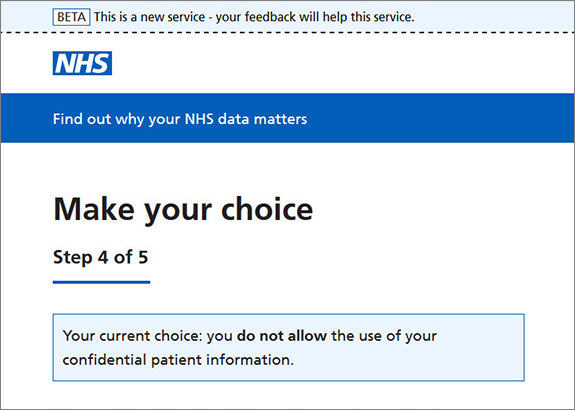The Government’s new draft strategy, “Data Saves Lives: Reshaping Health and Social Care with Data” is published today. [1]
The draft document – which took guidance on data and innovation from the same team as the OfQual A-levels mess last summer [2] – was developed by Matt Hancock’s ‘tech vision’ unit, NHSX (notably not an NHS body) being best known for its first draft of the COVID-19 app, and for thinking that no-one cares about the privacy of their GP records any more.
The draft manages just one, single, passing reference to last month’s catastrophically mishandled and miscommunicated GP data grab, [3] cited in “Progress so far” [4] to be implemented “later in 2021”. (Is this the announcement of the delay beyond September?)
Key paragraphs:
Aside from the stalled GP data grab, GPDPR, that same “Progress so far” list also mentions the highly secretive NHS England / NHSX COVID-19 Data Store, which feeds data to Palantir for Government’s favourite AI mercenaries, Faculty Science, to build dashboards. [5]
For over a year now, NHSE/X have refused to publish the list of projects and organisations to which they release data. The Government claims benefits, but shows none at all – if this is “progress”, then evidence, transparency and good governance are clearly out of the window.
One line that really matters is buried in section 3, “Supporting local and national decision makers with data”, [6] which says:
…we will use secondary legislation in due course to enable the proportionate sharing of data including, where appropriate, personal information for the purposes of supporting the health and care system without breaching the common law duty of confidentiality (ongoing)
[Further down the same section, it shows how they’ll give patients’ data to DWP…]
Does this Government really believe it can use “secondary legislation” to overturn the millennia-long trusted principle of doctor–patient confidentiality that lies at the very heart of healthcare?
The strategy regurgitates, almost unchanged, a set of “principles for data partnerships” [7] that were a Pharma-Bro-friendly Goat Rodeo [8] when they first surfaced two years ago, and which haven’t improved since. Its plaintive references to “transparency” and “citizen engagement” [9] don’t really hold water if – as medConfidential was – you participated in, gave expert testimony to, or were on the advisory panel to these efforts.
We’ve also heard quite a lot of this “strategy” before. Compare, for example, the “commitment” at the bottom of the first section of 2021’s draft strategy, [10] to “give citizens the ability to see what research their data has informed, and who has had access to their data, as soon as the technology allows (ongoing)” with the “Paperless 2020” vision of the previous administration, in particular the section on page 50, [11] about “Digital Services – the offering to the Citizen and his apps supplier (Phased 2015 –2018)”.
Phil Booth, coordinator of medConfidential said:
“Boris Johnson’s Government says “Data Saves Lives”, but buried in the small print is a rather more dubious deal: “If you want better care from your data, you must let us sell it.”
“Once, the PM remembered it was nurses and doctors who saved his life – and the next time Matt Hancock pontificates that patients “own their own data”, he should remember that taking something someone “owns” without their permission isn’t ‘sharing’ or ‘innovation’, it’s just plain theft.”
Notes to Editors
1) The draft strategy is published here: https://www.gov.uk/government/publications/data-saves-lives-reshaping-health-and-social-care-with-data-draft – as was first announced in the Government’s wider ‘National Data Strategy’ last September: “For example, NHSX is developing a Data Strategy for Health and Social Care in Autumn 2020, which will aim to build on the permissive approach to data sharing for care seen during the coronavirus response…” https://web.archive.org/web/20200909080611/https://www.gov.uk/government/publications/uk-national-data-strategy/national-data-strategy
2) CDEI’s (the Centre for Data Ethics and Innovation) advice is cited across the document; its outgoing Chair was in post at the time the advice was given: https://twitter.com/medConfidential/status/1357037423172141061
3) Links to news coverage of the 2021 GP data grab here: https://medconfidential.org/information/media-coverage/
4) In section 3, “Supporting local and national decision makers with data”: https://www.gov.uk/government/publications/data-saves-lives-reshaping-health-and-social-care-with-data-draft/data-saves-lives-reshaping-health-and-social-care-with-data-draft#supporting-local-and-national-decision-makers-with-data
5) Even Dominic Cummings seems unaware that NHS patients’ personal data, collected by NHS England under the COPI powers, was being fed to Palantir so that Faculty could build dashboards: https://twitter.com/EinsteinsAttic/status/1403496331965050881
6) Section 3, “Supporting local and national decision makers with data”: https://www.gov.uk/government/publications/data-saves-lives-reshaping-health-and-social-care-with-data-draft/data-saves-lives-reshaping-health-and-social-care-with-data-draft#supporting-local-and-national-decision-makers-with-data
7) In section 7, “Helping developers and innovators to improve health and care”: https://www.gov.uk/government/publications/data-saves-lives-reshaping-health-and-social-care-with-data-draft/data-saves-lives-reshaping-health-and-social-care-with-data-draft#helping-developers-and-innovators-to-improve-health-and-care
8) https://medconfidential.org/wp-content/uploads/2019/10/business-models.pdf – see page 3 for links to examples of how the proposed ‘business models’ have already all failed in practice.
9) At the bottom of the “Next steps” section, immediately above Annex A: https://www.gov.uk/government/publications/data-saves-lives-reshaping-health-and-social-care-with-data-draft/data-saves-lives-reshaping-health-and-social-care-with-data-draft#next-steps
10) Section 1, “Bringing people closer to their data”: https://www.gov.uk/government/publications/data-saves-lives-reshaping-health-and-social-care-with-data-draft/data-saves-lives-reshaping-health-and-social-care-with-data-draft#bringing-people-closer-to-their-data
11) Tim Kelsey, the architect of the previous GP data grab (“care.data”) in 2013/14, was the ‘Director for Patients and Information’ at NHS England when he presented this strategy: https://www.kingsfund.org.uk/sites/default/files/media/NIB%20Master%20Slide%20Deck%20v6.pdf
__
medConfidential has tracked the development of both Data Strategies since they surfaced last year: https://medconfidential.org/2020/the-national-data-strategy/ and has followed the evolution of ‘Shared Care Records’ for years before that: https://medconfidential.org/2021/shared-care-records/ – graphics on how the data will be used are in the second half of the page.
medConfidential campaigns for confidentiality and consent in health and social care, seeking to ensure that every use of data in and around the NHS and wider care system is consensual, safe and transparent. Founded in January 2013, medConfidential is an independent, non-partisan organisation working with patients and medics, service users and care professionals.
For further information or for immediate or future interview, please contact Phil Booth, coordinator of medConfidential, on phil@medconfidential.org
– ends –

